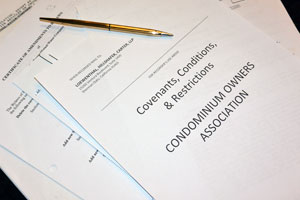LHC Newsletter Vol. 14, No. 2
Contact us Toll-Free: 1-866-474-5529 (info@lhclawyers.net)
By: Robert D. Hillshafer, Esq.
David A. Loewenthal, Esq.
Barbara A. Higgins, Esq.
NEW CASE LAW – 2022
Published Decisions:
Keen v. City of Manhattan Beach (2022) 77 Cal.App.5th 142
Significance: This case is a local battle over short term rentals and whether there was a valid amendment (or ordinance in effect) banning short term rentals (which the Coastal Commission normally would be required to approve because public access to the beach is a California priority).
Facts: In 1994, the City of Manhattan Beach enacted zoning ordinances, which the Coastal Commission then certified. The Court of Appeal considered whether the old ordinances permitted rentals of a residential property for fewer than 30 days. The popularity of Airbnb and similar platforms brought this question into play. The City never disputed it would need Commission approval to enact a new prohibition on short-term rentals within the coastal zone. That would be an “amendment.” Instead, the City has steadfastly maintained there was no amendment, because its old ordinances always prohibited short-term rentals. Keen disagreed, and that framed the issue in this case: whether the City amended its program when it clamped down on short-term rentals, or whether the prohibition was not an amendment because it merely continued the legal status quo.
Disposition: It was affirmed that the trial court was right in ruling that the City’s old ordinances did permit short-term rentals because there was no zoning provision identified to support that fewer than 30 day rentals were barred. The ordinances said nothing about the duration of the rentals. This meant that the City’s recent laws against platforms like Airbnb were held to be amendments requiring Commission approval, which the City never got. The Court concluded that the City was wrong to say that it had always banned short-term rentals when it did not have an express ordinance, or an approved amendment, banning STRs.
Kahn v. Price (09/22/2021) 69 Cal.App.5th 223
Significance: A tree obstructing a neighbor’s view is not a “permanent nuisance” with a 3-year statute of limitations, but instead is a “continuous nuisance”, with no statute of limitations.
Facts: A long-time homeowner brought a lawsuit against a neighboring Defendant landowner for declaratory and injunctive relief, claiming that a pine tree in the Defendant’s yard blocked views of the bay. The Court concluded that the burdens of the healthy, quick growing Monterey pine [where it was located] were “overwhelming” and the benefits “minimal”. The trial court ruled in favor of the Plaintiff neighbor and directed the tree’s removal and awarded sanctions.
Disposition: The ruling was affirmed on appeal. The Court of Appeal also reaffirmed that a landowner in California has no common law right to an unobstructed view over adjoining property and therefore, nuisance liability does not lie for a view obstruction under common law. Here, common law did not apply. the San Francisco tree ordinance that governed the issue was silent on the statute of limitations after prelitigation procedures. However, since the Plaintiff had a right to pursue an action under the tree ordinance which specifically allowed a complaining landowner to seek an abatement of a tree view obstruction, it also fell within the Civil Code 3479 definition of nuisance. The Court concluded that the tree view obstruction was a “continuing nuisance” that would not be permanently maintained as the tree kept growing and obstructing the views. Thus, the lawsuit was timely filed as the continuance nuisance doctrine rendered any statute of limitation inapplicable.
Chase v. Wizmann (2022) 71 Cal.App.5th 244
Significance: An action for noise nuisance is not automatically precluded because certain HVAC equipment noise did not violate the municipal ordinance decibel limits. The nuisance must be evaluated in terms of all the circumstances of the case according to an objective standard.
Facts: Property owners filed a lawsuit against their neighbors based on private nuisance and other theories for noise emanating from the neighbors’ air conditioning and pool equipment which they sought to have moved from under their bedroom window to the other side of the neighbors’ property. A preliminary injunction was granted and later challenged on appeal.
Disposition: Affirmed. The trial court did not abuse its discretion in concluding that the balance of the hardships favored issuing the preliminary injunction, and that Plaintiffs were likely to prevail on the merits of a private nuisance claims. There was substantial evidence that the equipment frequently operated constantly at all hours of the day and night. Moreover, the temporary restraining order was intentionally violated by the Defendants and their tenants. And, a violation of the municipal noise decibel ordinance was not a necessary prerequisite to the nuisance claim.
Protect Our Neighborhood v. City of Palm Springs (2022) 73 Cal. App.5th 667
Significance: Here, short term rentals (“STRs”) of single family residential homes were not considered “commercial” and were not outlawed by this City’s Zoning Code. The Code allowed STRs if “customarily incident to use as a dwelling.” Even though one city may consider STRs more commercial in nature (similar to a hotel), that does not hold true for all cities and their Zoning Codes which may contain allowable, permitted uses as this City did. The Court “decline[d] to re-write the Zoning Code.”
Facts: An organization of homeowners called “Protect our Neighborhoods” [that opposed STRs] filed a lawsuit against the City of Palm Springs and individual homeowners who were issued vacation rental certificates by the City. The Plaintiff organization sought a writ of mandate, and injunctive and declaratory relief for alleged violations of municipal codes and the California Environmental Quality Act CEQA arising from the City’s ordinance which authorized STRs. Judgment was entered in favor of the City and individual homeowner defendants.
Disposition: The Court of Appeal affirmed the judgment and held that (1) the STRs were “customarily incident to” permitted uses of a dwelling under the Zoning Code; (2) the City was not required to make special findings re similar, listed uses and that it was not more detrimental to other permitted uses; (3) the allowance of STRs was a legislative judgment which should be given deference; and (4) the Zoning Code did not require discretionary permits for STRs.
Hobbs v. City of Pacific Grove. 2022 WL 16921175 (Certified for Partial Publication 11/14/22)
Significance: Short term rentals of residential property are not considered to be a “vested right” in this economic use of real property.
Facts: This is an appeal by the homeowner Plaintiffs seeking a ruling that the City of Pacific Grove conferred on them a property right protected by the state and federal constitutions in the renewal of their licenses, after granting them one-year licenses to operate short-term vacation rentals using residential real properties. Plaintiffs contended that their economic interest in renting their vacation homes exclusively for transient visitors was an entitlement subject to state or federal constitutional protection as a matter of law. The City had used a lottery system to “sunset” and restrict the number of short term rentals, which meant that some granted licenses the year before were not renewed.
Disposition: Plaintiff’s claims were found to be without constitutional merit. After standing issues arose, the Court of Appeal limited its review to Plaintiff Shirkey’s due process challenge to an ordinance restricting the number of short term rentals allowed each year. The appellate court noted that the City’s curtailment of short-term rental licenses did not infringe on substantive due process, nor was it so unrelated to legitimate state interests.
Olson v. Doe (2022) 12 Cal.5th 669
Significance: It is important for a Board member (and Association) to understand that mediation or settlement agreements (which even include non-disparagement clauses) entered into between a Board member and another homeowner regarding their personal [civil harassment restraining order] disputes may not insulate the Board member (or Association) from subsequent civil claims arising out of related or continuing facts if there are no terms providing a release from liability or a waiver of claims.
Facts: Jane Doe, a resident homeowner, sought a civil harassment restraining order against the Board President for making sexual advances toward her and harassing her, which claims were eventually resolved through mediation. Doe later filed a civil lawsuit against the same Board President, HOA, and others seeking damages for the same or related underlying conduct, some of which, she alleged, had continued. The Board President cross-complained against Doe for breach of contract and specific performance, asserting that Doe had violated a non-disparagement clause in the parties’ mediation settlement agreement.
Disposition: The Supreme Court held that non-disparagement clause in the mediation settlement agreement did not apply to statements made in litigation, and Doe’s subsequent civil lawsuit could proceed. There was no global settlement or release in the agreement.
Artus v. Grammercy Towers Condominium. (2022) 76 Cal.App.5th 1043
Significance: The Court of Appeal found that neither party (Association or homeowner) was the prevailing party entitled to attorneys’ fees under the Davis-Sterling Common Interest Development Act.
Facts: Artus filed a lawsuit against the HOA for injunctive and declaratory relief as to election and voting rules and the adoption of sale and lease guidelines. The HOA defeated a portion of the lawsuit through a demurrer and anti-SLAPP motion, which left three remaining claims. While the lawsuit was pending, the HOA unilaterally decided to adopt new election rules and sale and leasing guidelines, rendering the three remaining claims moot. Both parties sought their attorney’s fees as “the prevailing party”.
Disposition: The Court rejected Artus’ argument that, regardless of the ultimate outcome, she was entitled to statutory fees and costs because she obtained preliminary injunctive relief. The Court determined that Artus was not the prevailing party because she only achieved one of her four main litigation objectives and the one objective was not a substantial win. In addition, her lawsuit did not result in significant benefit to the general public or to a large class of persons. The Court also determined the HOA was not a prevailing party because it could have adopted the rules and guidelines at any point and did not need a court order to do so. The Court also found that the HOA did not achieve their litigation objectives, or reduce or eliminate governance disputes between the HOA and Artus. The Court opined: “A defendant cannot take unilateral action without court order or court approval, to end a lawsuit, and then declare itself the victor and demand fees.”
Atain Specialty Ins. Co. v. Lake Lindero Homeowners Association. No. 21-55319
(9th Cir. 2022)
Significance: It is important for the Association to disclose all material facts and not conceal the facts about a possible, either known claim against them, or one that could result because of their actions, when asked to supply such information on an insurance application. Otherwise, there could be a recission of the policy coverage, even after being sued on the claim.
Facts: The Association completed an insurance application with Atain and was asked to disclose any facts, circumstances or situation where a claim might result against the Association or its directors or officers. A newly elected board member signed off on the application and did not disclose anything in response. However, a situation did exist that was likely to give rise to a claim against the Association involving their property management company. The Association had sent about eight notices to the management company alleging breach of the management agreement and threatened to terminate it even though there were years on the contract. Others had threatened the Board if they took action on the management agreement. The Board members knew that termination would likely lead to litigation.
Disposition: Attain’s Summary Judgment was upheld. The Court of Appeals held that Attain was entitled to rescind the policy and had no further duty to defend or indemnify the Association. The failure to disclose was considered to be concealment. A material misrepresentation or concealment on an insurance application can result in recission of a policy in the state of California.
Unpublished Decisions
(These are included here because they are instructive and provide guidance, but they cannot be cited as legal authority.)
Schwindt v. Omar 2022 WL 1550691
Significance: There are times when a Court will use its discretion to allow construction to remain in place even if the construction violated a provision of the CC&Rs. It also is a good idea to request monetary damages in addition to injunctive relief in case the Court is inclined to deny the request for injunctive relief.
Facts: A homeowner sued her neighbors next door in Newport Beach, alleging that their room addition was built in a prohibited patio area and unreasonably interfered with her view. The Association had approved the room addition over Schwindt’s objections. A bench trial was conducted which included a site visit. The Court found that the room addition was built in a prohibited patio area under the CC&Rs, but also concluded that the addition did not unreasonably interfere with Schwindt’s view. The request for a mandatory injunction was denied because the hardship to the Omars in removing their improvements would outweigh the hardship to the Schwindts in having to live with a slightly reduced view. In this case, the suing homeowner only asked for declaratory and injunctive relief, and not monetary damages.
Significant attorneys’ fees were awarded to the Omars, but only about one-third of those requested, and although the amount was deemed discretionary and was upheld, it was reduced in part by the failure of the Omars to participate in alternative dispute resolution (arbitration here) at the case commencement.
Disposition: The Judgment was affirmed on appeal and significant attorneys’ fees were awarded and upheld.
Ladera Ranch Maintenance Corp. v. Tinsley No. G060079 (Cal. Ct. App. Aug. 23, 2022)
Significance: The Court concluded that a large tarp anchored between a home and tree was considered an “Improvement” under the CC&Rs, as an “appurtenance” which encompassed within the definition of “Improvement. Dead trees planted by the developer cannot be removed by a homeowner because of drought conditions. A security sign mounted to a chain across an entryway did not comply with governing document signage requirements.
Facts: Tinsley installed a large tarp along the property line between his house and his neighbors without obtaining the Association’s approval. Neighbors complained and the Board determined it was unsightly and a nuisance in violation of the CC&Rs. In addition, without obtaining approval, Tinsley removed two trees planted by the developer between the sidewalk and the street in front of his home. He also failed to replace the trees despite Association requests and as required by the CC&Rs, so the Association replaced them. He claimed there was a drought in effect and the trees he took down were dead or dying, so he was justified in removing them and not replacing them. The Association sued Tinsley for violations of the CC&Rs, nuisance, and declaratory relief. Tinsley defended himself on the grounds that (1) the Association lacked authority under the CC&Rs for some of its actions, (2) did not conduct a reasonable investigation, and (3) did not act in good faith towards Tinsley as he was singled out for enforcement. Tinsley also cross-complained for the Association’s alleged failure to maintain a arear slope for which Tinsley paid extra. The Court found no merit to the cross-claims.
Disposition: The trial court entered judgment in favor of the Association against Tinsley and the Court of Appeal affirmed it. Among other things, the Court ordered removal of the tarp and a security sign mounted on a chain across the entryway of Tinsley’s property for which he was fined.
Orangecrest Country Community Association v. Burns. 2022 WL2072063
Significance: The Association will prevail if it fairly follows its own standards and procedures under the governing documents in a reasonable manner that is not arbitrary or capricious.
Facts: Defendant Burns, a homeowner, sought approval to build a wall across her front yard, but when her homeowners association denied her request, she built it anyway. After mediation and attempts to stop her construction failed, the Association sued Burns, seeking a permanent injunction requiring her to remove the wall. After the trial court issued the injunction, finding violations of the CC&Rs, Burns argued on appeal the affirmative defense of equitable estoppel to justify the wall and unfair discrimination because other homeowners were allegedly allowed to build walls in their front yards.
Disposition: The Court of Appeal did not see any merit to Defendant’s claims and affirmed the permanent injunctive relief granted. There was no evidence that the Association allowed other homeowners to build similar nonconforming walls. Equitable Estoppel did not apply because the Association was clear in its denial of approval of the wall and Burns was told not to build the wall multiple times before the wall was completed.


